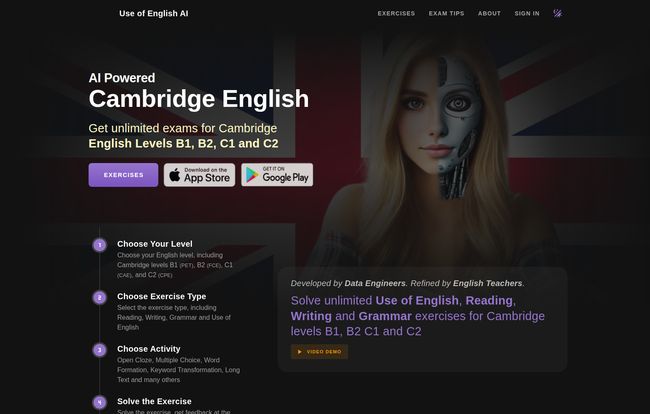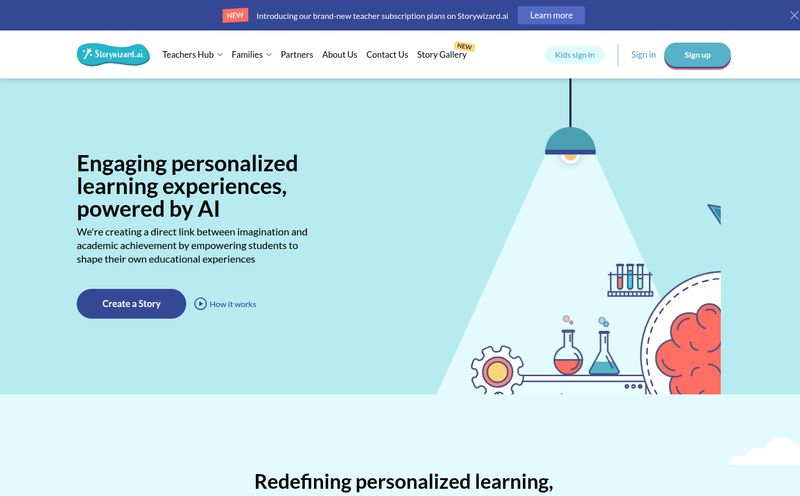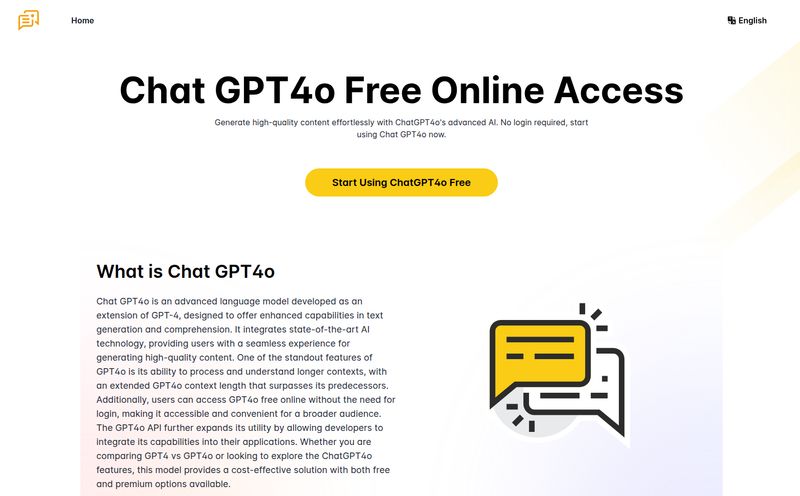Studying for a big language exam like the Cambridge English series can be an absolute grind. I remember the days of dog-eared textbooks, endless photocopies of practice tests, and that sinking feeling when you’ve burned through all your materials and still don't feel ready. You end up doing the same exercises over and over, hoping something new will magically stick. It’s exhausting, and frankly, a bit soul-crushing.
So, when I stumbled upon a platform called Use of English AI, my inner SEO and tech-nerd alarms went off. It promises unlimited, AI-generated practice for Cambridge levels B1 all the way up to the beastly C2. Unlimited? That’s a bold claim. Is it just another flash-in-the-pan AI tool, or is it genuinely the study partner we’ve all been waiting for? I had to find out.

Visit Use of English AI
First off, What is Use of English AI?
At its core, Use of English AI is a specialized training ground for anyone tackling the Cambridge English exams. We're talking the B1 Preliminary (PET), B2 First (FCE), C1 Advanced (CAE), and the C2 Proficiency (CPE). Developed by a team called Shining Apps LLC in partnership with the folks from Use of English PRO, it’s not just some random content generator. They claim their AI is trained on a massive diet of official Cambridge books and materials.
Think of it like having a personal tutor who has read every single Cambridge textbook ever published and can create a new, unique quiz for you on the spot, anytime you ask. It’s built to give you that endless stream of practice that, until now, just wasn't possible without buying a library's worth of books.
The AI Magic Behind the Curtain
So how does it work? It’s not just pulling from a static question bank. The platform uses some pretty sophisticated Natural Language Processing (NLP). It takes a database of over 5,000 exam-style questions and then the AI goes to work. It tweaks them, rephrases them, and sometimes creates entirely new variations on the spot. This means you’re not just memorizing answers; you’re actually learning to apply the rules in different contexts. It's the difference between learning a dance routine and actually learning how to dance.
The process for the user is dead simple:
- Pick your level: B1, B2, C1, or C2.
- Choose your poison: An activity like Multiple Choice, Word Transformation, or even a full Reading or Writing task.
- Get to work: Solve the exercise and get instant feedback.
This constant, subtle variation is the secret sauce. It keeps your brain engaged and prevents that dreaded feeling of rote memorization.
The Features That Actually Move the Needle
Okay, the tech is cool. But what does it mean for you, the student sweating over sentence transformations? Let’s break down the parts that I found most impressive.
A Truly Bottomless Pit of Practice
The “unlimited exercises” isn't just marketing fluff. Because the AI is constantly creating variations, you genuinely can’t run out of material. This is a game-changer for high-volume practice, which is critical for the Use of English and Reading papers. You can drill a specific skill—say, Part 4 Key Word Transformations for the C1 Advanced—until it's second nature. No more rationing your practice tests. Just fire it up and go.
It’s Not Just About Grammar Anymore
While the name is “Use of English AI,” it covers a lot more ground. You get practice for the Reading paper, including tricky parts like finding missing paragraphs. But the most exciting development I saw was the brand new AI Writing feature. This is huge. It doesn’t just give you a prompt; it provides detailed feedback, a score, and concrete tips on how to improve. Getting good, affordable feedback on writing is one of the biggest hurdles for self-study students, and this feature tackles it head-on. It's still AI, so it won't replace a human teacher, but for instant, 24/7 feedback? It's pretty amazing.
Feedback That Doesn’t Make You Want to Cry
We’ve all seen unhelpful feedback. A simple 'X' next to your answer does nothing to help you learn. This tool is different. When you get something wrong, it explains why it's wrong. This feedback loop is what separates passive reviewing from active learning. It also asks you to rate the exercises, which helps their AI get smarter. You’re not just a user; you’re part of the training process.
My Honest Take: The Good, The Bad, and The AI
No tool is perfect. As someone who lives and breathes this stuff, I’ve got to give you the full picture. After playing around with it for a while, here’s my completely honest breakdown.
On the plus side, the personalized, endless nature of the practice is brilliant. The AI-powered system means the platform adapts and keeps things fresh, which is a massive advantage over static PDFs or old books. The comprehensive coverage of all the Cambridge exams from B1 to C2 is another major win, making it a tool you can stick with as you advance. The detailed feedback is the cherry on top, turning mistakes into genuine learning opportunities.
However, there are a few things to keep in mind. The free access is quite limited—you only get one exercise a day (or three every 5 minutes according to another part of the site, so there might be some slight inconsistency there). It’s enough for a taster, but not for serious study. The biggest quirk for me is that once you close an exercise, it's gone forever unless you saved the specific URL. This is by design, to encourage fresh practice, but I can see it frustrating some users who like to review past work. It's a 'use it or lose it' kind of deal. Also, they admit that very rarely you might see the same exercise twice, though user ratings help weed those out.
The All-Important Question of Pricing
Here’s where things get a bit hazy. The homepage I analyzed doesn’t have a clear “Pricing” page link. It’s a bit of a pet peeve of mine when sites aren’t upfront about cost. However, we can piece things together. There's a clear distinction between a free user and a 'PRO' user.
From what I can gather:
- Free Plan: Lets you generate one exercise per day.
- PRO Plan: Seems to offer much more frequent generation (one every 5 minutes is mentioned). This is what you’d need for intensive study.
To get the actual cost of the PRO plan, you'd likely need to create an account or download the app, which is available on both the Apple App Store and Google Play. I’d expect a monthly or annual subscription model, which is pretty standard for this kind of service.
So, Who Is This For?
I see a few groups getting a ton of value from Use of English AI:
- The Dedicated Self-Learner: If you’re disciplined and need a firehose of high-quality practice material, this is your new best friend.
- The Resourceful Teacher: English teachers could use this to generate fresh warm-ups, homework assignments, or in-class quizzes without spending hours creating them from scratch.
- The “Almost Ready” Student: If you’re in the final weeks before your exam, this tool is perfect for high-intensity drilling to sharpen your skills and build confidence.
It’s probably not for the casual learner who just wants to dip their toes in. The platform is very exam-focused and built for people with a clear goal.
Frequently Asked Questions
Is Use of English AI completely free?
No, not completely. There is a free tier that offers limited daily exercises. For unlimited access and more frequent practice, you would need to upgrade to their PRO plan, which is a paid subscription.
What Cambridge English exams does it cover?
It covers four main levels: B1 Preliminary (PET), B2 First (FCE), C1 Advanced (CAE), and C2 Proficiency (CPE).
Can I use this tool on my smartphone?
Yes. The website mentions buttons for both the Apple App Store and Google Play, indicating that they have dedicated mobile apps for learning on the go.
Does the AI create exercises from thin air?
It's a mix. The AI is trained on a huge database of over 5,000 real exam questions. It then uses that knowledge to tweak, adapt, and create new variations of those exercises, so you're always getting relevant, exam-style practice.
What happens if I accidentally close my practice exercise?
According to their site, once you close an exercise, it's gone for good. The platform is designed to provide a fresh experience each time. If you want to save a particular exercise, you need to copy and save its specific URL.
How good is the AI writing feedback?
The AI writing feature is designed to give you instant feedback on quality, provide a score, and offer improvement tips. While it's an incredibly powerful tool for immediate practice, it's best viewed as a supplement to, not a replacement for, feedback from an experienced human teacher.
Final Thoughts on Cracking the Code
Look, the world of SEO and digital tools is flooded with AI right now. Some of it is hype, some of it is genuinely useful. I’d place Use of English AI firmly in the 'genuinely useful' camp. It addresses a real, painful problem for language learners: the lack of sufficient, high-quality practice material.
It won't magically pass the exam for you—you still have to put in the work. But it can be an incredibly powerful ally. It’s like having a tireless sparring partner who knows all your opponent's moves. If you're serious about your Cambridge exam preparation, especially for the B2, C1, or C2 levels, I think giving their free trial a spin is a no-brainer. It might just be the edge you need to walk into that exam room with confidence.
Reference and Sources
All information and analysis are based on the content available on the official platform website:



